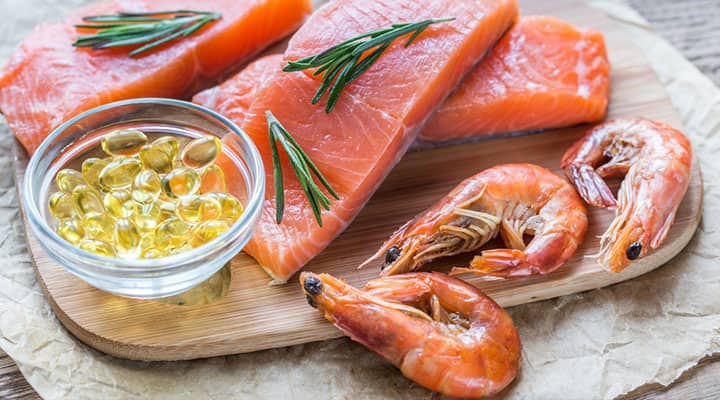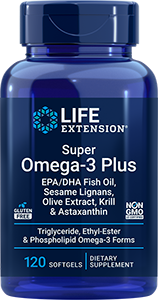
Is Fish Oil Good for Your Brain?
Published: April 2021
You've probably heard that fish oil is good for you, and with good reason: it has tremendous heart and skin health benefits. Want another reason to get "hooked" on this supplement? Fish oil is great for your brain.
In fact, studies show that brain tissue contains the highest concentration of DHA, or docosahexaenoic acid, which is available in abundance in the oil from fatty fish like salmon, herring and mackerel (to name a few). DHA, together with EPA, or eicosapentaenoic acid, serves as a major building block for your brain.
Needless to say, you should be piling your plate high with fatty fishes to get these brain-boosting benefits, advised Life Extension's Education Specialist, Dr. Crystal M. Gossard, DCN.
And if the idea of adding more fat to your diet is a concern, Dr. Gossard is happy to debunk that myth. "It can actually help support a healthy weight by maintaining already-healthy blood sugar, promoting satiety and promoting a healthy inflammatory response," she explained.
So, how do fish oil's fatty nutrients help your brain? Let's dive in.
What does fish oil do to the brain?

Fish oil's well-earned reputation as a healthy-heart must-have is due to EPA, which promotes cardiovascular health and a healthy inflammatory response, according to Dr. Gossard. It's DHA that we can thank for helping to promote brain and nerve cells and supporting brain health by maintaining healthy brain cell membranes, she added.
But since your brain, a collection of neurons and other brain cells, is 60 percent fat, both of these nutrients are crucial for normal brain development and function at every stage of your life.
Fish oil helps preserve brain function

Higher intakes of omega-3s can protect brain cells from cellular stress and help inhibit inflammatory factors to support brain health and function, as well as brain size, according to a large body of scientific research.
A 2014 study published in Neurology, for example, showed that postmenopausal women with higher DHA and EPA levels in their blood had larger total normal brain and hippocampal volume (your brain's memory and learning center) eight years after the study. Simply put, these fatty acids appear to help preserve and delay the normal loss of brain cells that naturally will occur over time, as we age.
Memory-healthy nutrient
Eventually, it happens to many of us; we misplace things, fumble with a word, or can't remember someone's name. Age-related cognitive decline, which can affect memory and overall cognition, is as natural as graying hair or less limber joints.
While aging spares no one, fortunately, there are steps you can take to preserve your brain health. Besides a brain-friendly lifestyle, adding more DHA and EPA to your diet may significantly support memory, learning and performance, especially over time. "Because DHA and EPA fatty acids are an intrinsic part of your brain cells, increasing their intake can enhance cell-to-cell communication, improving memory and focus," Dr. Gossard explained.
Now, occasionally misplacing your car keys or mixing up your kids' names doesn't mean you should be concerned about your memory. Still, it's never too early to start being proactive about maintaining overall cognitive wellness.
Explore Our Best Brain Health Supplements
Fish oil's other cognitive benefits

While we can't say that consuming more fish oil will give you cerebral superpowers, a higher intake of omega-3s DHA and EPA have been associated with the following cognitive health benefits:
- Better brain blood circulation—Adding more omega-3 fish oil to your diet has been shown to support blood flow, which in turn distributes oxygenated and nutrient-rich blood to your brain and, of course, the rest of your body.
- Better mood—Studies suggest that higher omega-3 levels can support mood health because they can cross the blood-brain barrier and interact with mood-related pathways in your brain.
There you have it—multiple reasons why ordering salmon for dinner is a smart choice. And if you're not a fish lover, you can still reel in the benefits of fatty fish oil with a high-quality supplement.
How much fish oil should I take?

If cheeseburgers and fries make up your main meals, it's likely you're not getting enough DHA and EPA from your foods. Consider following more of a Mediterranean diet, and look for ways to incorporate more fresh produce, fatty fish and other healthy fats like olive oil and nuts.
But before you stock up on tons of salmon, keep in mind that you don't want to go overboard! Overeating fatty fish can do more harm than good, according to Dr. Gossard. "Limit fatty fish to two servings per week to reduce intake of heavy metal that's found in large fatty fish," she advised. "Taking a high-quality fish oil supplement will fill in any nutritional gaps and provide optimal dosing."
Speaking of which, while there is no official recommended dietary allowance for fish oil you should get, there are guidelines. "At Life Extension, we suggest healthy adults get 1400 mg of EPA and 1000 mg of DHA daily," Dr. Gossard said.
That being said, each body breaks down foods and absorbs nutrients in a slightly different way. That's why you might want to start out with lab testing, which can reveal your current DHA and EPA numbers; from there, you can determine how much your body needs.
Your brain is how you experience and interact with the world; it's also where you keep life's most precious memories. That's why the sooner you start being proactive about your mental wellness, the better. Increasing your omega-3 intakes is a great place to start, because you're giving your body crucial nutrients it needs to maintain cognitive health and performance--especially in the long haul.
References
- Howe, Peter RC, et al. "Effects of Long chain Omega-3 Polyunsaturated Fatty Acids on Brain Function in Mildly Hypertensive Older Adults." Nutrients. October 2018. https://www.ncbi.nlm.nih.gov/labs/pmc/articles/PMC6213246/
- Külzow, Nadine, et al. "Impact of Omega-3 Fatty Acids Supplementation on Memory Functions in Healthy Older Adults." J Alzheimer’s Dis. 2016. https://pubmed.ncbi.nlm.nih.gov/26890759/
- Weiser, Michael J, et al. "Docosahexaenoic Acid and Cognition Throughout the Lifespan." Nutrients. February 2016. https://www.ncbi.nlm.nih.gov/labs/pmc/articles/PMC4772061/
- "Can Fish Oil Help Preserve Brain Cells? American Academy of Neurology. January 2014. https://www.aan.com/PressRoom/Home/PressRelease/1234




